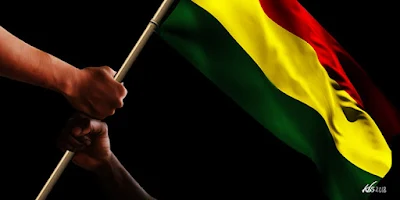Pan-Africanism began as a revolutionary idea—a movement dedicated to unifying Africans and fostering independence from colonial powers. Leaders like Kwame Nkrumah of Ghana, Julius Nyerere of Tanzania, and Patrice Lumumba of Congo championed this ideology with fervor, believing that the collective strength of a united Africa would free the continent from the chains of exploitation and oppression. However, what started as a noble cause for self-determination and economic liberation slowly unraveled, leading to the very problems it sought to eliminate. Corruption, exploitation, and poor governance infiltrated the vision, spurred in part by Western powers' covert and overt actions.
The Rise of Pan-Africanism: A Vision for Unity and Prosperity
Pan-Africanism emerged as a reaction to the systemic exploitation and division sowed by colonial rule. In the late 19th and early 20th centuries, African intellectuals and leaders rallied for a united continent where African resources were managed by Africans for the benefit of their people. This vision was evident in Nkrumah’s call for African unity: “We must unite now or perish. We must recognize that our economic independence resides in our African union.”
The vision was clear: an Africa that was politically free, economically self-sufficient, and culturally proud. The establishment of the Organization of African Unity (OAU) in 1963 marked a significant step toward this goal, as it aimed to promote unity, defend sovereignty, and work towards the eradication of colonialism.
Western Interference: The Corruption of African Leadership
However, the Pan-African dream soon faced sabotage from outside forces. As African nations gained independence, the West—driven by Cold War interests and a relentless appetite for natural resources—sought to maintain control over the continent's wealth. Western nations and multinational corporations began to meddle in African politics, manipulating leaders, funding coups, and installing puppet regimes to protect their economic interests.
Notable examples include the assassination of Congo's Patrice Lumumba in 1961, a leader who had fervently opposed Western interference and sought to control Congo's vast mineral wealth for the benefit of its people. His death, which was orchestrated with the involvement of Western powers, marked a turning point in the history of African leadership. It signaled that any leader who prioritized African interests over Western agendas could face dire consequences.
Kwame Nkrumah also fell victim to this external manipulation. His overthrow in 1966 was supported by Western powers concerned about his socialist leanings and his push for a united Africa that would challenge Western economic dominance. As Nkrumah once lamented, “The neo-colonialism of today represents imperialism in its final and perhaps its most dangerous stage.”
The Impact of Resource Exploitation on African Governance
The scramble for African resources intensified as Western companies established contracts that heavily favored foreign interests at the expense of local economies. Leaders who cooperated with these companies often received kickbacks, and in return, they turned a blind eye to exploitative practices that stripped their nations of wealth and environmental health. For instance, Nigeria’s oil wealth, which should have transformed the nation, instead fueled corruption and environmental degradation, as highlighted by the notorious actions of foreign oil companies in the Niger Delta.
The West's economic stranglehold was maintained through predatory trade agreements and loans that kept African countries in a perpetual state of debt. African leaders were often complicit, seduced by the allure of power and wealth. This toxic relationship stifled economic growth and perpetuated a leadership culture that prioritized personal gain over national progress.
Pan-Africanism’s Promise Derailed: The Consequences of Leadership Failures
While Pan-Africanism advocated for shared economic and political systems, the dream crumbled under the weight of compromised leadership. Leaders who should have been torchbearers for African unity were instead co-opted, sowing seeds of distrust and fragmentation across the continent. The failure to establish a cohesive economic front allowed external forces to continue their plunder of African resources.
The consequences of these leadership failures are starkly visible today. Many African countries remain rich in resources but poor in terms of economic development and living standards. Corruption remains rampant, and many nations struggle under the weight of external debt and exploitative economic policies set by Western-dominated financial institutions like the International Monetary Fund (IMF) and World Bank.
The Way Forward: Rekindling the Pan-African Dream
Despite its challenges, the ideals of Pan-Africanism are not entirely lost. The African Continental Free Trade Area (AfCFTA), launched in 2021, is a renewed attempt to unite the continent economically and break free from Western economic dependence. Leaders such as Rwanda’s Paul Kagame have called for a reawakening of Pan-African values, urging a new generation of leaders to reclaim Africa’s destiny: “We have to build Africa where Africans have dignity, where Africans have the right to their resources, and where we cooperate to add value and benefit from them.”
Reclaiming the Pan-African dream requires a recommitment to transparency, good governance, and unity. It involves resisting the allure of external interference and fostering a culture of accountability among African leaders. The future of Pan-Africanism lies not just in the hands of political leaders but in the collective will of the African people to demand better governance and fair distribution of resources.
Conclusion: A Dream Worth Fighting For
Pan-Africanism started as a beacon of hope, but it was marred by external interference and the internal failures of leadership. To blame Pan-Africanism for Africa’s woes would be an oversimplification; instead, it is the corruption of the dream and the betrayal by some of its leaders that led to the continent's current struggles. As Africa looks forward, there is still hope to reignite the true spirit of Pan-Africanism—one that values unity, self-reliance, and sovereignty. Only by confronting the past and reclaiming the vision can Africa rise to the prosperity it so richly deserves.




.jpg)
What do you think about this?